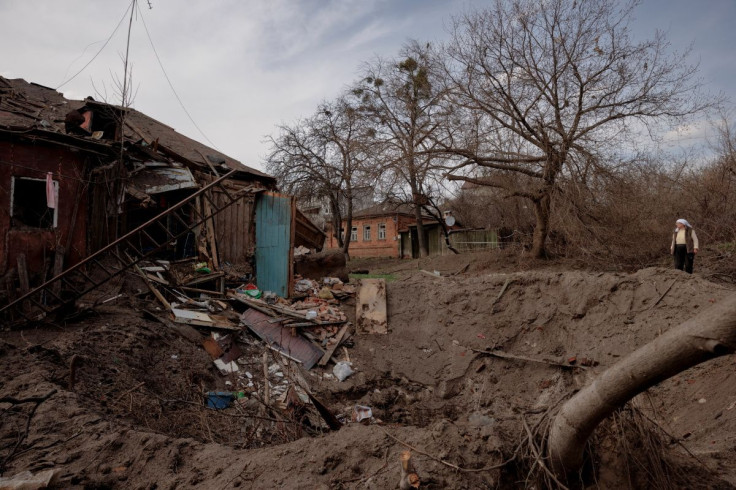Ukraine Demands Tough Global Response To Train Station Missile Strike

Ukraine called for more weapons and harsher sanctions after it blamed Russia for a missile attack that killed at least 52 people at a train station packed with women, children and the elderly fleeing the threat of a Russian offensive in the east.
President Volodymyr Zelenskiy called the strike in Kramatorsk, in the eastern region of Donetsk, a deliberate attack on civilians. The city's mayor estimated 4,000 people were gathered there at the time.
The United States, the European Union and Britain condemned the incident which took place on the same day European Commission President Ursula von der Leyen visited Kyiv to show solidarity and accelerate Ukraine's membership process.
"We expect a firm global response to this war crime," Zelenskiy said in a video posted late on Friday.
"Any delay in providing ... weapons to Ukraine, any refusals, can only mean the politicians in question want to help the Russian leadership more than us," he said, calling for an energy embargo and all Russian banks to be cut off from the global system.
Regional governor Pavlo Kyrylenko said the station was hit by a Tochka U short-range ballistic missile containing cluster munitions, which explode in mid-air, spraying lethal bomblets over a wider area.
Reuters was unable to verify what happened in Kramatorsk.
Cluster munitions are banned under a 2008 convention. Russia has not signed it but has previously denied using such armaments in Ukraine.
Russia's more than six-week long incursion has seen more than 4 million people flee abroad, killed or injured thousands, left a quarter of the population homeless and turned cities into rubble as it drags on for longer than Russia expected.
Russian families buried relatives killed in Ukraine with gun salutes and military bands on Friday, a day after the Kremlin said for the first time it had lost significant numbers of troops.
In Washington, a senior defense official said the United States was "not buying the denial by the Russians that they weren't responsible", and believed Russian forces had fired a short-range ballistic missile in the train station attack.
The Russian defence ministry was quoted by RIA news agency as saying the missiles said to have struck the station were used only by Ukraine's military and that Russia's armed forces had no targets assigned in Kramatorsk on Friday.
Russia has denied targeting civilians since President Vladimir Putin ordered the invasion on Feb. 24 in what he called a "special military operation" to demilitarise and "denazify" Russia's southern neighbour.
Ukraine and its Western supporters call that a pretext for an unprovoked invasion.
Ukrainian officials now expect an attempt by Russian forces to gain full control of Donetsk and neighbouring Luhansk in the east, both partly held by Moscow-backed separatists since 2014.
The Kremlin said on Friday the "special operation" could end in the "foreseeable future" with its aims being achieved through work by the Russian military and peace negotiators.
NATO Secretary General Jens Stoltenberg has warned the war could last months or even years.
The White House said it would support attempts to investigate the attack in Kramatorsk, which Britain's Prime Minister Boris Johnson said showed "the depths to which Putin's vaunted army has sunk".
At least 52 people had been killed in the blast, according to the regional military administration.
'NOT AS USUAL'
The wreckage of the missile bore the words "for the children" on its side. Russia has for years accused Ukraine of killing civilians including children with strikes in separatist-held eastern Ukraine.
As Russia concentrates on the east, Ukrainian forces there said late on Friday that they had repelled seven Russian attacks, destroying nine tanks, seven other armored vehicles and two helicopters. Reuters could not independently verify that.
Following a partial Russian pullback near Kyiv, a forensics team on Friday began exhuming a mass grave in the town of Bucha. Authorities say hundreds of dead civilians have been found there.
Russia has called allegations that its forces executed civilians in Bucha a "monstrous forgery" aimed at denigrating its army and justifying more sanctions.
Visiting the town on Friday, von der Leyen said it had witnessed the "unthinkable".
She later handed Zelenskiy a questionnaire forming a starting point for the EU to decide on membership, telling him: "It will not as usual be a matter of years to form this opinion but I think a matter of weeks."
Austrian Chancellor Karl Nehammer is due to visit on Saturday for talks with Zelenskiy.
The bloc also overcame some divisions to adopt new sanctions, including bans on the import of coal, wood, chemicals and other products alongside the freezing of EU assets belonging to Putin's daughters and more oligarchs.
EU foreign policy chief Josep Borrell said the possibility of an oil ban would be discussed on Monday but called oil sanctions "a big elephant in the room" for a continent heavily reliant on Russian energy.
The United States on Friday broadened its export curbs against Russia and ally Belarus, restricting access to imports of items such as fertilizer and pipe valves.
Ukraine on Thursday secured a new commitment from NATO to supply a wide range of weapons.
Slovakia has donated its S-300 air defence system to Ukraine, while Britain will send a further 100 million pounds ($130 million) of military support.
In Prague, defence sources said the Czech Republic had delivered tanks, rocket launchers, howitzers and infantry fighting vehicles and would ship more.
© Copyright Thomson Reuters 2024. All rights reserved.







